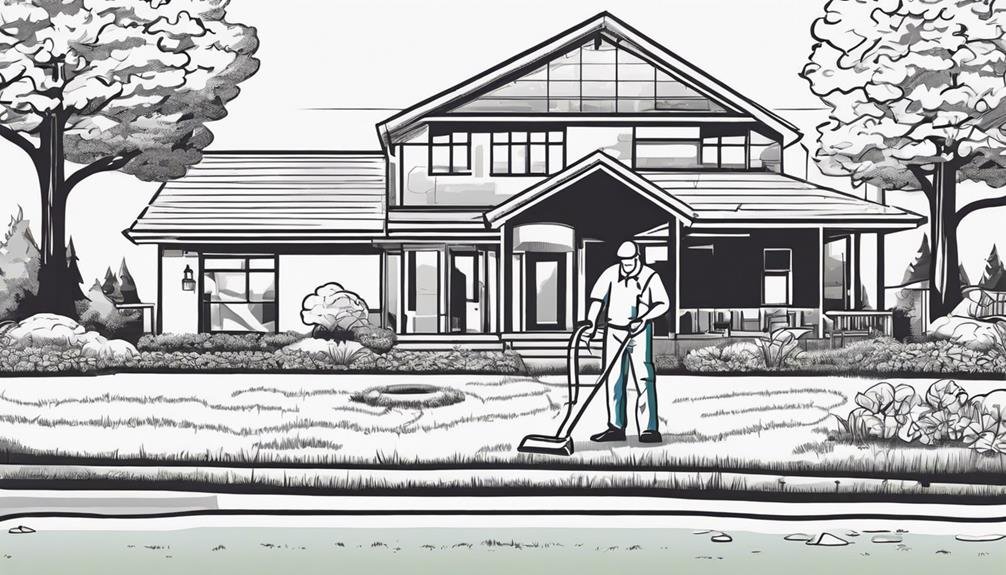Have you ever wondered if there are simple ways to avoid septic system backups? Understanding the importance of regular maintenance could be the key to preventing costly and inconvenient issues down the line.
By implementing a few essential tips, you can ensure the smooth operation of your septic system. From identifying warning signs to adopting effective maintenance practices, there are steps you can take to safeguard your system.
Stay tuned to discover how you can proactively protect your septic system and avoid backups.
Key Takeaways
- Regular maintenance like pumping every 3-5 years prevents backups and maintains system functionality.
- Watch for signs like gurgling sounds, slow drains, odors, and backups to prevent issues.
- Effective practices include tank pumping, grease trap cleaning, water monitoring, and avoiding non-biodegradable items.
- Seek professional help for inspections, immediate assistance, and guidance on maintaining a healthy septic system.
Importance of Regular Pumping

Regular pumping of your septic system is crucial in preventing backups and maintaining its optimal functionality. The pumping frequency is a key factor that directly impacts the system's capacity to handle wastewater efficiently.
As a rule of thumb, it's recommended to have your septic tank pumped every 3 to 5 years, depending on factors such as household size, water usage, and tank size. Neglecting this maintenance task can lead to the accumulation of solids in the tank, reducing its capacity to treat wastewater effectively.
Signs of Potential Backup
When monitoring your septic system for signs of potential backup, pay close attention to unusual gurgling sounds coming from your drains. These sounds may indicate a developing issue that requires your immediate attention.
Here are some early warning signs to help you identify potential backup:
- Slow Draining Fixtures: If you notice slow drainage in sinks, showers, or toilets, it could be a sign of a pending backup.
- Foul Odors: Unpleasant smells coming from your drains or around your yard can signal a problem within your septic system.
- Water Backup: Water backing up into sinks, tubs, or toilets is a clear indication that your septic system isn't functioning properly.
- Lush Green Patches: Unexpectedly lush and green patches of grass near your drain field may indicate excess moisture and potential backup issues.
Effective Maintenance Practices

To maintain the optimal functioning of your septic system, adhering to a consistent maintenance schedule is essential. Regularly pumping out your septic tank is crucial to prevent solids from overflowing into the drain field, which can lead to clogging and system failure. A general rule is to have your tank pumped every 3-5 years, but this can vary based on household size and water usage.
Additionally, inspecting and cleaning the grease trap, if your system has one, is important to avoid grease buildup that could potentially block the drain field. Monitoring water usage, fixing leaks promptly, and avoiding flushing non-biodegradable items are simple yet effective practices to maintain the health of your septic system.
Furthermore, planting trees or shrubs away from the drain field can prevent root intrusion, which could damage the pipes. By incorporating these maintenance practices into your routine, you can ensure the longevity and efficiency of your septic system.
Professional Inspection and Help
Seeking professional inspection and assistance is crucial for ensuring the optimal performance and longevity of your septic system. When it comes to maintaining your septic system, relying on expert help can make a significant difference. Here are some essential points to consider:
- Emergency Assistance: Professionals can provide immediate help during septic system emergencies, such as backups or leaks, preventing further damage and ensuring a swift resolution.
- Regular Inspections: Scheduled professional inspections can identify potential issues early on, allowing for timely repairs and preventing major breakdowns.
- Advanced Equipment: Professionals have access to specialized tools and equipment that enable them to conduct thorough inspections and repairs effectively.
- Guidance on DIY Troubleshooting: Experts can offer guidance on simple maintenance tasks you can perform yourself, empowering you to take proactive steps in preserving your septic system's health.
Frequently Asked Questions
Can Using Certain Household Products or Chemicals Affect the Health of My Septic System?
Using harmful cleaners and chemicals can have a detrimental impact on your septic system's health. These products can disrupt the balance of good bacteria, leading to clogs and backups. It's crucial to avoid them for proper system maintenance.
How Often Should I Have My Septic Tank Inspected for Potential Issues?
You should have your septic tank inspected every 1-3 years to ensure its health. By sticking to a regular maintenance schedule, potential issues can be caught early, preventing costly repairs and keeping your septic system running smoothly.
Are There Any Specific Landscaping or Gardening Practices That Can Help Prevent Backups in My Septic System?
To prevent backups in your septic system, consider soil composition for proper drainage, select plants that won't cause root intrusion. These landscaping practices can help maintain your system's functionality and reduce the risk of issues.
What Should I Do if I Notice a Foul Odor Coming From My Septic System?
If you notice a foul odor from your septic system, ensure proper odor control measures by inspecting the system regularly. Maintaining a consistent inspection frequency will help you identify and address any issues promptly, keeping your system functioning efficiently.
Are There Any DIY Methods for Preventing Backups in My Septic System, or Is Professional Help Always Necessary?
Want to tackle septic backups yourself? DIY solutions like regular pump-outs, proper waste disposal, and using septic-safe products can help. However, professional help ensures thorough inspections and maintenance schedules for long-term peace of mind.
Conclusion
In conclusion, maintaining your septic system is crucial to prevent potential disasters. Regular pumping, being vigilant of warning signs, and implementing effective maintenance practices are key to avoiding backups.
Remember, a small issue left unattended can quickly escalate into a major problem. Trust the professionals to inspect and provide assistance when needed.
Don't let a backup become a catastrophe – stay proactive and keep your septic system running smoothly for years to come.
 Just pennies per day.
Just pennies per day.
 Protect your home now.
Protect your home now. From THIS... to Fresh & Clean
From THIS... to Fresh & Clean 
 Kills bacteria.
Kills bacteria.
 Try SEPTIFIX today.
Try SEPTIFIX today.
